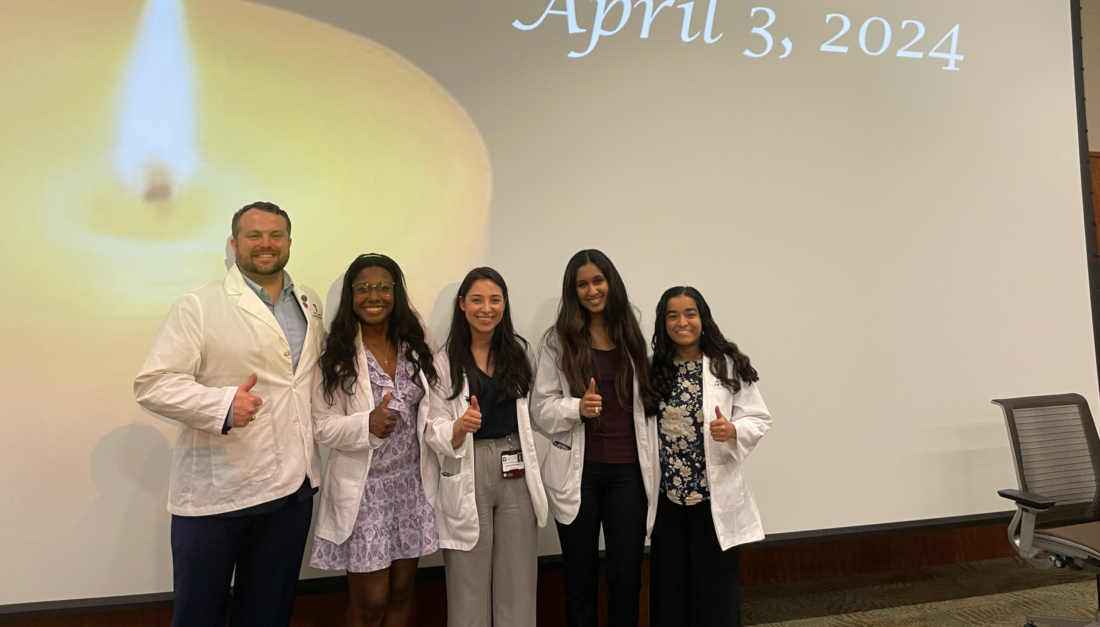COM Rural Family Medicine Training in Beeville
Americans love television medical dramas. They tune in to watch glamorous Hollywood doctors who are just as likely to encounter a patient with multiple gunshot wounds as start dating the newest nurse on staff.
But while physicians in Beeville, Texas may never be the stars of a network television drama, they are making a far more lasting impact by helping to educate future doctors. Beeville physicians Dr. Grady Hogue, Dr. Joseph Larakers and Dr. Francisco Calica are instructors for a new rural family medicine training program for students from the College of Medicine at the Texas A&M University System Health Science Center.
All third-year medical students are required to complete six- to 12-week clerkships in family medicine, internal medicine, obstetrics and gynecology, pediatrics, psychiatry and surgery. The physicians-in-training usually receive their instruction at the more traditional facilities of the college’s clinical partners, most often at the Scott & White hospital in Temple. But the benefit of studying family medicine in a rural community is the opportunity students have to work more closely with physicians and patients.
Third-year medical student Brett Chamberlin recently completed the required six-week family medicine clerkship in Beeville as the first student in the rural track pilot program. Chamberlin was supervised by Dr. Hogue during his training and was provided housing and other logistical support by CHRISTUS Spohn Hospital in Beeville, perks that were not lost on the program’s first student. “The hospital provided a great apartment that was nicer than anything I could have picked out for myself, and provided lunch for me every day. Does it really get any better than that?” Chamberlin joked.
Two more third-year students are currently training in Beeville and several more are scheduled to complete their family medicine clerkships in the rural program this year.
The goal of the family medicine program at the College of Medicine is to prepare medical students for family-oriented health care delivery and to give students an understanding of the family as a basic unit of society. The rural atmosphere provides a unique experience compared to what students might encounter in a larger community. Organizers of the program are hoping training experiences like the one in Beeville will draw more medical students into a family medicine career in a rural area.
“The rural track offers students a real life view of family practice,” Dr. Hogue said. “I believe the experience will reinforce learning back at medical school, improve student self-confidence and hopefully generate more interest in primary care, specifically in underserved rural areas.”
The program is the result of hard work by many people, particularly Dr. Juan Castro and Dr. Marc Via. Dr. Castro, director of the Coastal Bend Health Education Center in Corpus Christi, was instrumental in recruiting the local faculty, arranging the local activities and helping to plan the local Faculty Development Programs. Dr. Via is the clerkship director in Family Medicine for the College of Medicine and is responsible for making student-faculty assignments, setting the rotation schedule and devising mechanisms to assure the students training in Beeville have a comparable experience to those who stay on the traditional clinical campus.
Rural track family medicine students have the opportunity to develop a clear understanding of the professional role and clinical issues of primary care physicians. The pilot program trains students to apply the principles of community-oriented primary care and the continuous improvement of quality of care.They also have the opportunity to become actively involved in community-based activities, learn about the role a physician plays in the community and experience the unique qualities of a rural lifestyle. Students are expected to participate in all activities at the site including outpatient encounters, hospital rounds, staff meetings, social events and other activities that the attending faculty deems appropriate.
This has been the best experience of my third year,” Chamberlin said. “The people in Beeville were incredibly outgoing and their hospitality was outstanding. I can’t say enough good things about everybody I worked with. They made me feel like I was truly taking steps toward becoming a doctor.”
Media contact: media@tamu.edu


